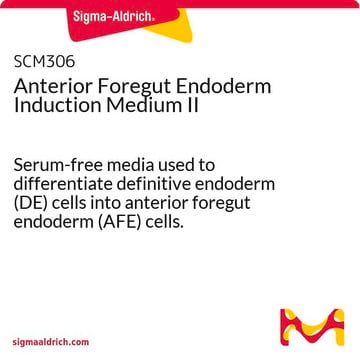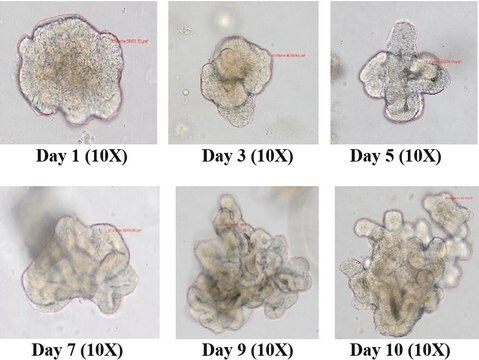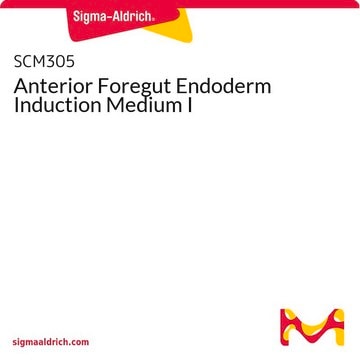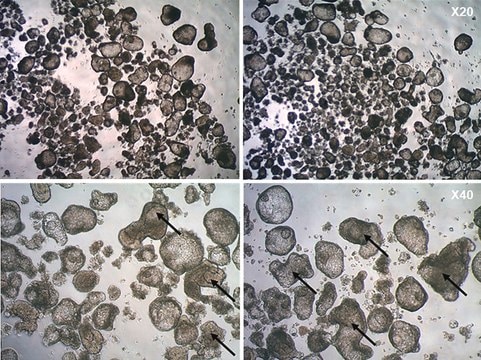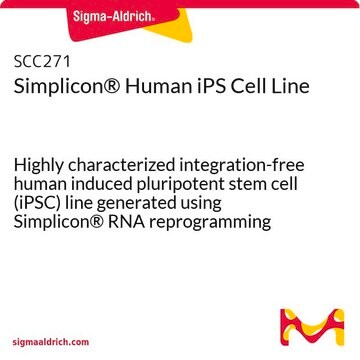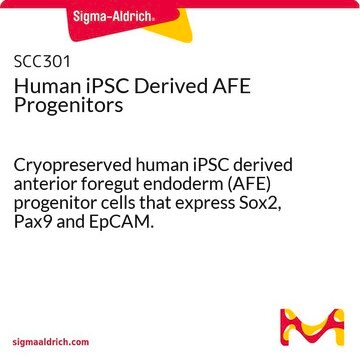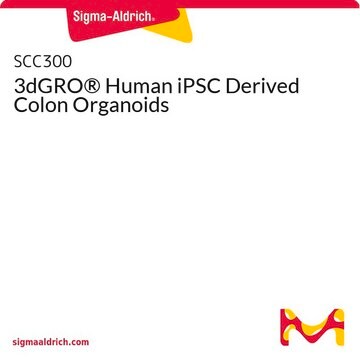SCM302
Definitive Endoderm Induction Medium
Synonym(s):
Definitive Endoderm Medium, Endoderm Induction Medium, Medium for Endoderm Induction
About This Item
Recommended Products
form
liquid
packaging
pkg of 50 mL
technique(s)
cell culture | stem cell: suitable
impurities
<2 EU/mL endotoxin
pH
7.0-7.4
application(s)
cell analysis
General description
The 3-day differentiation protocol is simple and has been validated on multiple human iPS cell lines. Differentiated cells express high levels (>85%) of endoderm markers including CXCR4, c-Kit, Sox-17 and FOXA2 and can be further differentiated into specialized endodermal cell lineages. Definitive Endoderm Induction Medium can be used to generate 3D organoids such as hiPS derived colon (Cat. No. SCC300) and lung organoids.
Application
Research Category:
Stem Cell Research
Quality
Sterility Tested: No growth
Endotoxin: <2 EU/mL
pH: 7.0-7.4
Mycoplasma: Negative
Functional Assay: >85% CXCR4+ c-Kit+ double positive after 3 days of induction.
Storage and Stability
Disclaimer
Storage Class Code
12 - Non Combustible Liquids
WGK
WGK 2
Flash Point(F)
Not applicable
Flash Point(C)
Not applicable
Certificates of Analysis (COA)
Search for Certificates of Analysis (COA) by entering the products Lot/Batch Number. Lot and Batch Numbers can be found on a product’s label following the words ‘Lot’ or ‘Batch’.
Already Own This Product?
Find documentation for the products that you have recently purchased in the Document Library.
Articles
Lung organoids are valuable 3D models for human lung development and respiratory diseases. The 3dGRO™ differentiation protocol generates organoids from human iPSCs in 4 steps.
Lung organoids are valuable 3D models for human lung development and respiratory diseases. The 3dGRO™ differentiation protocol generates organoids from human iPSCs in 4 steps.
Lung organoids are valuable 3D models for human lung development and respiratory diseases. The 3dGRO™ differentiation protocol generates organoids from human iPSCs in 4 steps.
Lung organoids are valuable 3D models for human lung development and respiratory diseases. The 3dGRO™ differentiation protocol generates organoids from human iPSCs in 4 steps.
Protocols
Highly characterized cryopreserved human colonic organoids and a step-by-step organoid culture protocol for epithelial intestinal organoid differentiation from iPS cells.
Highly characterized cryopreserved human colonic organoids and a step-by-step organoid culture protocol for epithelial intestinal organoid differentiation from iPS cells.
Highly characterized cryopreserved human colonic organoids and a step-by-step organoid culture protocol for epithelial intestinal organoid differentiation from iPS cells.
Highly characterized cryopreserved human colonic organoids and a step-by-step organoid culture protocol for epithelial intestinal organoid differentiation from iPS cells.
Our team of scientists has experience in all areas of research including Life Science, Material Science, Chemical Synthesis, Chromatography, Analytical and many others.
Contact Technical Service